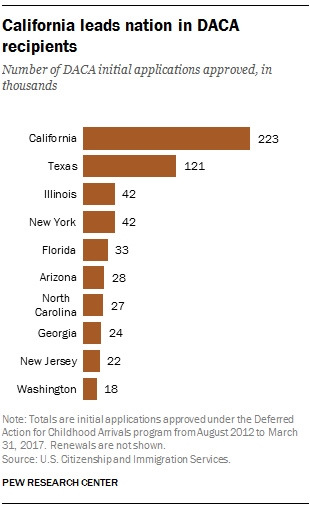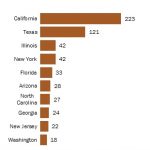DACA recipients by the numbers: Who’s affected? Where do they live? What now?
President Trump’s decision to rescind the Deferred Action for Childhood Arrivals, or DACA, program is generating enormous blowback from pro-immigration groups, business leaders, politicians, and the general public–some of whom took to the streets in Washington and New York today to protest the move. The Obama-era program allowed undocumented immigrants who came to the United States as children to remain in the country.
Here are some key statistics on DACA recipients:
- Nearly 790,000 people have received work permits and deportation relief since it was enacted in 2012.
- 1.1 million people were eligible for the benefits, according to a 2014 Pew estimate.
- By far, California received the highest number of initial DACA applications at 223,000. Texas, New York, Illinois, and Florida rounded out the top five states.
- 95% of DACA recipients are working or in school, according to a 2016 survey.
- 54% of DACA recipients recently bought their first car, according to a 2016 survey; 12% bought a home.
- 21% of DACA recipients work in education and health services, the highest of any other industry, according to a 2016 survey.
- DACA helped raise wages: According to a 2016 survey, recipients made an average wage of $13.96 and hour, compared to $9.83 an hour before DACA.

So what happens now? The White House issued a statement on what rescinding the program means. Crucially, “all existing work permits will be honored until their date of expiration up to two full years from today.” However, new applications for work permits will no longer be accepted. Applications “already in the pipeline” will be processed. Read the full statement here.
Download this @DefineAmerican fact-sheet on everything you need to know about #DACA: https://t.co/R5NJTeJUTU#immigration#FactsMatterpic.twitter.com/hIspSbBKAC
— #DefendDACA (@joseiswriting) September 2, 2017
The statistics cited above come from two sources: a Pew Research Center report and a 2016 survey conducted by UCSD’s Tom K. Wong, United We Dream, National Immigration Law Center, and Center for American Progress.
Fast Company , Read Full Story
(18)












